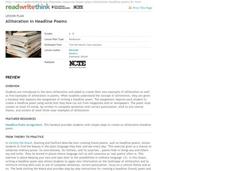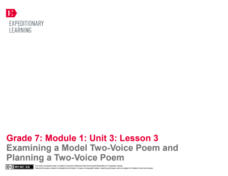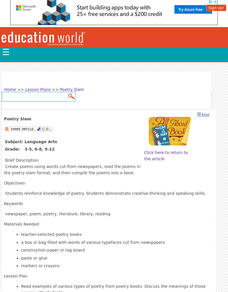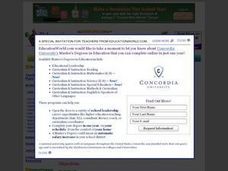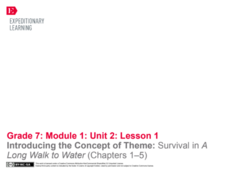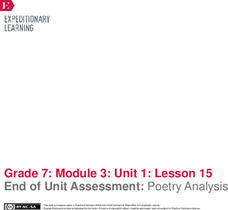ReadWriteThink
Alliteration in Headline Poems
Poetry is everywhere you look! Create found poems using headlines from newspapers and magazines. Young poetry focus on creating alliterative phrases with words they find in headlines, tying their poems to a central theme.
Curated OER
Reading Poetry in the Middle Grades
Bring the beauty of "Nothing Gold Can Stay" by Robert Frost to middle school language arts. After learners read a copy of the poem, they follow an instructional sequence that focuses on sound, figurative language, and theme.
Poetry Society
War Horse and WWI Poetry
Here's a resource that deserves a place in your curriculum library. As part of their study of War Horse individuals create an anthology of World War I poetry.
Poetry4kids
Onomatopoeia Poetry Lesson Plan
Two exercises boost scholars' knowledge of a onomatopoeia with excerpts from famous poems. In exercise one, participants circle onomatopoeia words. Exercise two challenges writers to choose three words to use in an original poem.
BW Walch
“Outsider” Poet Kay Ryan Goes from Poetry Club Reject to Poet Laureate
The cat might have got your tongue, but you can’t avoid the elephant in the room while you wait for the other shoe to drop. After all, the early bird gets the worm and the chickens are circling. After researching Poet Laureate Kay Ryan...
Poetry4kids
Personification Poetry Lesson Plan
Scholars take part in two exercises to boost their knowledge of personification. After reading a detailed description and excerpts from famous poems, writers list action verbs and objects then combine words to create a humorous...
EngageNY
Examining a Model Two-Voice Poem and Planning a Two-Voice Poem
Successful poetry writing requires three P's: planning, preparation, and practice. Pupils read a model two-voice poem and discuss how the author uses evidence to develop the theme. With a partner, scholars use a rubric to analyze the...
EngageNY
Poetry Analysis: Small Group Practice
Howdy partner! After discussion and teacher model reading of Slaveships, scholars pair up for a partner reading of the poem. They then use equity sticks to discuss their thoughts of the poem with the class. Readers talk about allusion,...
National Endowment for the Humanities
Poems that Tell a Story: Narrative and Persona in the Poetry of Robert Frost
Dig in deeper with Robert Frost's, "Stopping by Woods on a Snowy Evening." Learners will read and discuss poems by Robert Frost and learn the meaning of terms such as narrative and personal. They journal, collaborate, and present poetry...
Curated OER
Technopoet - Poetry Lesson Plans
Practice word processing while writing different types of poems. First, elementary and middle schoolers use Word templates to write poetry. They use rhyming and descriptive words as they work with clipart, text wrapping, and picture...
Crafting Freedom
George Moses Horton: Crafting Virtual Freedom Through Poetry
What is "virtual freedom"? How about "enslaved entrepreneurship"? Class members will learn about these terms and much more as they read the poems and examine the life of George Moses Horton.
MENSA Education & Research Foundation
Magical Musical Tour: Using Lyrics to Teach Literary Elements
Language arts learners don't need a lecture about poetry; they listen to poetry every day on the radio! Apply skills from literary analysis to famous songs and beautiful lyrics with a instructional activity about literary devices. As...
Curated OER
Poetry Slam!
Create poems without writing! Young poets create poems using words cut from newspapers, read their poems aloud, and compile them in a book. This lesson allows the teacher to view each learner's creative process and assess their current...
Curated OER
The Study of Theme and Figurative Language in Poetry and/or Prose
Identify and analyze the use of figurative language used in select pieces of writing. These pieces of literature will represent at least two pieces by one writer and at least two pieces by different writers. This lesson would be a great...
Read Write Think
Poetry Portfolios: Using Poetry to Teach Reading
Over the course of five periods, scholars create a poetry portfolio. They begin with a reading of the poem, Firefly. With a focus on vocabulary, learners reread the poem then look for sight words and other skills.
Curated OER
Biographical Poems
Students write a biographical poem about themselves. They observe a teacher-led demonstration, write an autobiographical poem and a biographical poem about a famous person using a template form, and display the poems side-by-side.
National Council of Teachers of English
A Bear of a Poem: Composing and Performing Found Poetry
Scholars work collaboratively to compose a found poem from one of their favorite stories. With a finished product in hand, class members form a circle and perform their work for an audience by taking turns reciting one line till the poem...
National Council of Teachers of English
Writing Poetry with Rebus and Rhyme
Young scholars write rhyming poems using rebus. With pictures instead of words, authors create original work about things they love.
Curated OER
Spring into Poetry
How many different types of poetry are there? Let me count them; list poems, haiku, and makes-me-think poems are only a few. Learners create their own poems accompanied by artistic projects such as haiku poems written on kites.
Curated OER
Poetry Shopping Spree
Scholars demonstrate the ability to evaluate authors' use of literary elements such as metaphor, simile, personification, imagery, and onomatopoeia. They are provided with a checklist and must shop for poems that contain the poetry terms...
EngageNY
Launching the Performance Task: Planning the Two-Voice Poem
Two voices, one poem. Scholars learn about and write a two-voice poem using graphic organizers, model poems, and guides. They practice reading poems with a partner and discuss how a poem of this type could help compare Salva and Nya in A...
EngageNY
End of Unit Assessment: Poetry Analysis
Learners finish the end-of-unit assessment by completing a poetry analysis of We Wear the
Mask. Scholars may use their Poet’s Toolbox reference sheets and How to Read a Poem anchor
charts to guide them through the assessment.
Pixton Comics Inc.
Elements of an Epic
Mythic heroes, gods and goddesses, and epic tales come alive as young artists craft their own graphic novel or mind map for classic epics, including The Odyssey, Beowulf, Harry Potter, and Star Wars, identifying the six elements of every...
EngageNY
Performance Task: Two-Voice Poem Readings
Eye contact, volume, and pronunciation are key ingredients to a successful presentation. Pupils present their two-voice poems to the class with their poetry reading partners. Next, to wrap up the unit, scholars use a worksheet to reflect...


